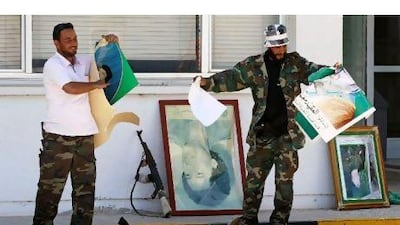ZAWIYAH // Families packed into hundreds of vehicles fled Zawiyah to the mountains yesterday as rebels battled on the streets to push Col Muammar Qaddafi's forces out of the city.
After two days of fighting, the rebel forces claimed control of the local oil refinery and large parts of the city, although fighting continued in the city's east and centre. Clouds of black smoke billowed from the centre of town.
"We have full control over the Zawiya oil refinery and we have liberated the whole city except two main streets," rebel commander Col Ali Ahrash said yesterday. He said Col Qaddafi's troops were still in control of Gamal Abdel-Nasser Street and were hiding in the hospital there.
Nader Hajid, a surgeon whose office is near Zawiyah's Garden square, said the area was now the main battlefield of the city.
"Rebels are coming in with tanks and they are not letting any civilians inside," Mr Hajid said.
Since the rebels entered Zawiya last week, their most dramatic advance after months of stalemate, Col Qaddafi's troops have been pounding homes, mosques and streets with rockets and mortar fire.
On Wednesday, rockets targeted rebel positions along the road that links Tripoli with the Tunisian border. The road, a key supply route for Col Qaddafi's regime, is now controlled by the rebels, with pickup trucks loaded with machine guns heading towards the city centre.
"I would never have thought to see a war at my doorstep," said Abdel Basat Ammar, 21, sitting quietly in front of his house about 200 metres from where missiles were falling.
"Residents of Zawiyah rose up and initiated the fight," said Col Jumaa Ibrahim, a rebel military spokesman in the western mountains, the desert cliffs overlooking the coastal plains from where the rebels started the offensive.
"This is the strategy we'll use to conquer other towns on our way to Tripoli, once Zawiyah falls," he said.
Control of Zawiyah, 50 kilometres from the capital and the site of Col Qaddafi's headquarters, is considered a critical step in the continuing battle for control of Libya.
The city is on a key road to the border with Tunisia that Col Qaddafi's regime relies on for food and fuel supplies.
On Tuesday, in Bir Gardan, a small village on the Tunisian side of the border, a border guard said in the past few days the traffic of trucks across the border went down from hundreds a day to a dozen. In the nearby villages, the smuggling of fuel across the border is booming.
"There are often blackouts and every day is more difficult to find all kinds of food," said a Tripoli resident at a checkpoint in Bir Ayyat who was fleeing the city with his family. At a desk, in front of him, sat Hakim Ali, a rebel fighter, writing down the passengers' names and their ID numbers in an accounting book.
"Just today 2,000 families passed through here, from Zawiyah, Tripoli, Sabratha, Sorman," and other cities where there is fighting, said Mr Ali. "They are escaping from the fighting and from the lack of supplies. The war is getting closer to the capital."
Libya's civil war began in February, with the rebels quickly wresting control of much of the eastern half of the country, as well as pockets in the west. The conflict later settled into a stalemate with the rebels failing to budge the front lines in the east since April.
However, in recent weeks, rebels based in the western Nafusa mountains have advanced toward Qaddafi-held towns along the coast.
The capture of the 120,000-barrel-a-day refinery in Zawiya is more a symbolic coup for the rebels, without having a major impact on Qaddafi's ability to secure fuel.
The flow of crude to the refinery from fields in the south-west of Libya had largely been halted since midsummer. The refinery was believed to be running at about a third of its normal apacity, drawing mainly on crude oil that was in its storage tanks. Zawiya mostly produced fuel oil, not petrol.
Back in Tripoli, the Qaddafi regime's prime minister Al Baghdadi Ali Al Mahmoudi said the government was in negotiations with rebels. "We are also calling on all sides for a ceasefire," he said.
Col Qaddafi's government has called for a ceasefire before, but continued to bomb towns where rebels tried to take power.
On a second front, hundreds of miles from Zawiya around the coastal town of Brega, rebels clashed with government troops for control of the refinery. Rebels control the two residential units in the oil terminal but have spent almost a week fighting for the refinery.
* With additional reporting by the Associated Press

